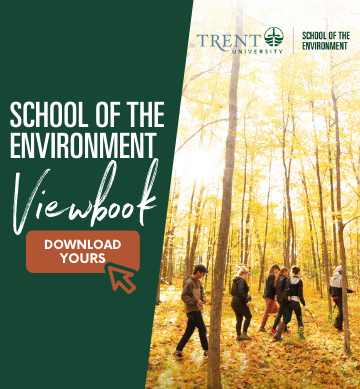We had an exciting week in the TSE as staff and faculty "crashed" the last class lectures of four of our esteemed faculty, who are all set to retire after the Winter 2022 term.


April 4, 2022: Shaun Watmough and Stephen Bocking April 6, 2022: Tom Whillans and Shaun Watmough


April 6, 2022: Shaun Watmough and Jim Buttle April 7, 2022: Shaun Watmough and Peter Lafleur
Prof Stephen Bocking started teaching at Trent in 1994. Before working at Trent he taught part-time at York University and U of T, and had a one-year job at the University of British Columbia. After working at those big universities, he was really happy to have the opportunity to work at a smaller place with such a beautiful campus. "The best part of my experience at Trent has been the students I've taught over the years. They are so serious about learning, and are so interested in our environment and in making a difference in the world. Whether it's discussing environmental issues on the other side of the world (in my Environment and Development course), or the campus environment (in my Environmental History course), there have been countless moments of connection and inspiration."
Prof Jim Buttle started teaching at Trent in 1983 immediately after receiving a PhD from Southampton, UK. Best part of Trent – the collegiality between faculty, staff and students, and the willingness of others to tolerate my sense of humour. Favourite teaching moment – playing golf with Miles Ecclestone on the ice on Knob Lake in Quebec in February during the Geog342 fieldtrip while the students were augering holes in the ice. “Studying geography at university is supposed to be challenging. If it was easy, anybody could do it.”
Prof Peter Lafleur grew up in south-west Manitoba and did an undergraduate degree in geography at Brandon University in the late 1970s. After realizing there was more to life than small town Manitoba, he came to Trent in May 1982 at the urging of Peter Adams and Colin Taylor (a very personal approach) to be one of the first students in the new Watershed Ecosystems Graduate program; he then went on to start a PhD in the Geography Department at McMaster in 1984, where he spent time traipsing around the wilds of the James Bay lowlands assessing climate-wetland interactions. After graduating he came directly to Trent for a 1-year contract and here he is 34 years later. He is probably most well-known for teaching the required Natural Science Statistics course for about 20 years. His most memorable course was the Geog386H field course, and having the great pleasure of taking students to far away places, like Northern Ireland, Barbados, England, Quebec, and the Canadian Rockies (many times). "I have been blessed in my career at Trent in that I was able to do everything I wanted to do. I have had the pleasure of working with great people here at Trent. I have many fond memories of students I have taught and the only advice I freely offer is to go out and make the most of the life we have been given and be nice to others and the planet."
Prof Tom Whillans started at Trent in 1983 with a PhD from University of Toronto in Zoology (areas of emphasis: fish ecology, environmental impact assessment, osteoarchaeology). Best parts of Trent: The connections to field research and teaching through community engagement. In that regard, the three most personally memorable experiences are (a) the 33 years of involvement with the Haliburton community’s environmental stewardship through U-Links and its predecessor, (b) the projects from 1992 to 2003 in South America on community based watershed rehabilitation in regions of primarily Indigenous heritage, and (c) the creation of the Ecological Restoration B.Sc., Indigenous Environmental Science/Studies B.Sc./B.A. and Sustainability Studies M.A. over the past 20 years. "Prepare to be surprised."




